 In our last BookNotes newsletter I listed a few books that might make nice gifts for college graduates. Naturally, I promoted my own book, Serious Dreams: Big Ideas for the Rest of Your Life (Square Halo Books; $13.99 // our sale price = $11.19) I and my fellow authors may not get any royalties from it, but I believe in it.
In our last BookNotes newsletter I listed a few books that might make nice gifts for college graduates. Naturally, I promoted my own book, Serious Dreams: Big Ideas for the Rest of Your Life (Square Halo Books; $13.99 // our sale price = $11.19) I and my fellow authors may not get any royalties from it, but I believe in it.
Last year somebody bought a bunch for high school graduation, saying that he was going to tell his students going off to college or technical schools that the college commencement inspiration in the book was the “end game.” He wanted them to read it before going to college so they could imagine being the kind of people taking their faith seriously enough in these critical years so that, a few years later, they would be reading to serve God in their careers and vocations. I was honored, of course, and inspired that a church would be having these kinds of conversations with their rising young adults, including offering guidance on living faithfully in the future in their jobs and civic lives.
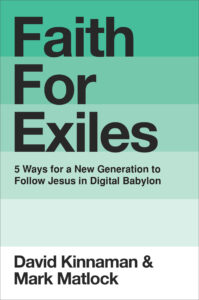 In David Kinnaman’s book Faith for Exiles: 5 Ways for a New Generation to Follow Jesus in Digital Babylon (Baker; $21.99//our sale price = $17.59) he and his co-author, Mark Matlock explore some data gleaned from young adults who have remained active in church and ways churches that retain their young adults do so. One of the chapters— that mentions our bookstore work helping folks think well about their life in the work-world, by the way — notes that high-school and college-age young adults are not likely to stick around a church that doesn’t address their most passionate concerns, including finding meaningful work, discerning a calling, leaning into the language of vocation.
In David Kinnaman’s book Faith for Exiles: 5 Ways for a New Generation to Follow Jesus in Digital Babylon (Baker; $21.99//our sale price = $17.59) he and his co-author, Mark Matlock explore some data gleaned from young adults who have remained active in church and ways churches that retain their young adults do so. One of the chapters— that mentions our bookstore work helping folks think well about their life in the work-world, by the way — notes that high-school and college-age young adults are not likely to stick around a church that doesn’t address their most passionate concerns, including finding meaningful work, discerning a calling, leaning into the language of vocation.
I circle back to this line of thinking from time to time here at BookNotes and observe that too few bookstores (and, frankly, too few churches) help people think Christianly about work by offering books about this topic. We are glad you care and invite you to learn about more resources than can inspire you and yours.
We hardly use the word calling well these days except, of course, for pastors or those going into para-church ministry or missionary work. Or the equally religious-sounding word, vocation. Media study majors? Future English teachers? Engineering students? Those going into the trades — electricians and mechanics and landscapers? Chefs, coaches, truckers? Yes, these careers are all avenues of rewarding and fulfilling service as God calls ordinary people to be salt and light and leaven in each sphere of society. These “offices” and stations and workplaces are all holy spaces to which God sends us. They can be more than mere jobs, but holy vocations. Churches that don’t offers this missional vision routinely as part of their worship, preaching, and education, will — Kinnaman pretty much documents it — lose their young adults and, I think, hamper their other adults as well, who, also, are called to work (as unto the Lord) in these complicated places in these hard economics times. Does the church not care?
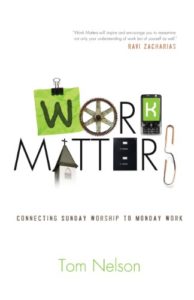 In his fabulous read, Work Matters: Connecting Sunday Worship to Monday Work Tom Nelson (Crossway; $17.99 // our sale price = $14.39) explains how he missed much of this when he pastored, calling his own blind spots “professional malpractice.” Eventually he learned to come alongside his people in their various vocations — teachers, architects, nurses, parents — and bless them, empowering them to see themselves as God’s workers in the world. There are so many other great books on this topic (see here for a list of many of my BookNotes lists announcing lots of good books on work.)
In his fabulous read, Work Matters: Connecting Sunday Worship to Monday Work Tom Nelson (Crossway; $17.99 // our sale price = $14.39) explains how he missed much of this when he pastored, calling his own blind spots “professional malpractice.” Eventually he learned to come alongside his people in their various vocations — teachers, architects, nurses, parents — and bless them, empowering them to see themselves as God’s workers in the world. There are so many other great books on this topic (see here for a list of many of my BookNotes lists announcing lots of good books on work.)
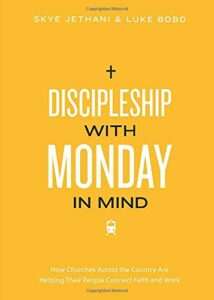 Discipleship with Monday in Mind by Skye Jethani & Luke Bobo (Made to Flourish; $9.99 // our sale price = $7.99) is a one-of-a-kind, fabulous little volume that shows some of the broad reflections (and practical ideas) of what many churches are doing to reject the “sacred vs secular” dualism and “privatization” of faith while helping mentor people towards Monday faithfulness. That is, these are ideas congregational leaders can apply immediately to re-imagine a whole-life sort of discipleship and an intrinsic relation between congregational life and public life. Buy a handful and start a little study group among your leadership team and see how you might amplify your own ministry to equip folks to live out their faith in their work lives.
Discipleship with Monday in Mind by Skye Jethani & Luke Bobo (Made to Flourish; $9.99 // our sale price = $7.99) is a one-of-a-kind, fabulous little volume that shows some of the broad reflections (and practical ideas) of what many churches are doing to reject the “sacred vs secular” dualism and “privatization” of faith while helping mentor people towards Monday faithfulness. That is, these are ideas congregational leaders can apply immediately to re-imagine a whole-life sort of discipleship and an intrinsic relation between congregational life and public life. Buy a handful and start a little study group among your leadership team and see how you might amplify your own ministry to equip folks to live out their faith in their work lives.
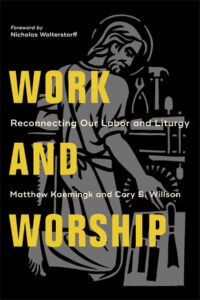 Work and Worship: Reconnecting Our Labor and Liturgy by Matthew Kaemingk & Cory Willson (Baker Academic; $29.99 // our sale price = $23.99) comes with a great forward by Nicholas Wolterstorff. who has written deeply about liturgy and worship and holds a great concern for Christian fidelity in the workplace. (He has an excellent chapter in Serious Dreams, by the way, a great message delivered as a graduation speech at his own Calvin University.) Work and Worship is considerably thicker than many of the titles shown here and is a significant, rich, resource that a church can draw on for years to come. I am sure you know how we have promoted it in the past, naming it as one of the Best Books of the Year a couple of years ago. It remains a one-of-a-kind, magisterial volume, offering both theory and practice, so to speak, essays about the relationship of labor and liturgy and plenty of actual worship aids — prayers, hymns, litanies and the like — for creatively raising up work in our worship services..
Work and Worship: Reconnecting Our Labor and Liturgy by Matthew Kaemingk & Cory Willson (Baker Academic; $29.99 // our sale price = $23.99) comes with a great forward by Nicholas Wolterstorff. who has written deeply about liturgy and worship and holds a great concern for Christian fidelity in the workplace. (He has an excellent chapter in Serious Dreams, by the way, a great message delivered as a graduation speech at his own Calvin University.) Work and Worship is considerably thicker than many of the titles shown here and is a significant, rich, resource that a church can draw on for years to come. I am sure you know how we have promoted it in the past, naming it as one of the Best Books of the Year a couple of years ago. It remains a one-of-a-kind, magisterial volume, offering both theory and practice, so to speak, essays about the relationship of labor and liturgy and plenty of actual worship aids — prayers, hymns, litanies and the like — for creatively raising up work in our worship services..
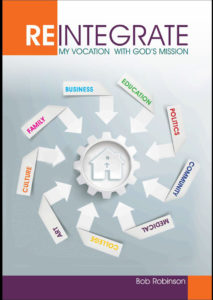 Reintegrate: Your Vocation with God’s Mission by Bob Robinson (Good Place Publishing; $14.00 // our sale price = $11.20) is my favorite small group Bible study on these themes — it is ideal for those new to this “all of life redeemed” worldview and excellent for those already in the work-world. There is simply nothing like it and I’m always happy when folks discover it and take the plunge into forming small groups being intentional about this common-place but often ignored ministry arena.
Reintegrate: Your Vocation with God’s Mission by Bob Robinson (Good Place Publishing; $14.00 // our sale price = $11.20) is my favorite small group Bible study on these themes — it is ideal for those new to this “all of life redeemed” worldview and excellent for those already in the work-world. There is simply nothing like it and I’m always happy when folks discover it and take the plunge into forming small groups being intentional about this common-place but often ignored ministry arena.
There are bunches of books these days developing Christian perspectives on work (I listed a few recent ones here.) We’ve got more books on this than you can imagine.
However, all of this — circling back to that list I did for college grads — sort of assumes that God might be calling some people to certain careers. That we have been gifted by God with certain abilities and talents that equip us to serve in places God has appointed for us (as it says in Ephesians 2:10.) Yet, how does one know? Isn’t it a little late to give a college graduate a book on discerning one’s vocation after she has spent years preparing to be a nurse or journalist or chemist? Indeed.
AND SO…
To wit: here, then, are some books on thinking about calling and vocation, about discerning God’s will, about hearing and being guided by God’s Spirit. This is tricky business, actually, and I don’t want to overstate this — clearly God doesn’t whisper into everybody’s ear just what we are supposed to do in life. It doesn’t work that way, usually. I do not want to create what singer-songwriter Mark Heard once called “another good lie.” But having some theological notions and some spiritual practices in our tool kit, so to speak, under our feet and in our bones, can help. I’ll list a bunch — some simple, some more complex, some rather theoretical and some quite practical. I hope they are helpful.
BOOKS ON DISCERNING THE GUIDANCE AND WILL OF GOD
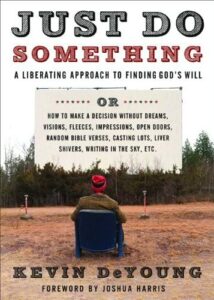 Just Do Something: A Liberating Approach to Finding God’s Will Kevin DeYoung (Moody Press) $11.95 OUR BOOKNOTES SALE PRICE = $9.56
Just Do Something: A Liberating Approach to Finding God’s Will Kevin DeYoung (Moody Press) $11.95 OUR BOOKNOTES SALE PRICE = $9.56
Simple, edgy, cool, solid, non-nonsense advice from a young, conservative, Reformed preacher who sets us free from hyper-spirituality and hocus-pocus. This has sold like a zillion copies and yet too many people still haven’t heard that it just isn’t that complicated. As Oswald Chambers wrote a century ago, “Trust God and do the next thing.”
I like the long subtitle on the cover: “Or: How To Make a Decision Without Dreams,Visions, Fleeces, Impressions, Open Doors, Random Bible Verses, Casting Lots, Liver Shivers, Writing in the Sky, Etc.” This is a nifty little book for those that need it.
 Reimagine the Ignition Examen: Fresh Ways to Pray from Your Day Mark Thibodeaux (Loyola Press) $12.95 OUR BOOKNOTES SALE PRICE = $10.36
Reimagine the Ignition Examen: Fresh Ways to Pray from Your Day Mark Thibodeaux (Loyola Press) $12.95 OUR BOOKNOTES SALE PRICE = $10.36
This is a powerful, delightful, and very useful little guide to the old “examen” spiritual practice from Saint Ignatius. Fr. Thibodeaux is a Jesuit and a great writer who offers us a flexible bit of prayerfulness to cultivate the art of spiritual discernment of God’s hand in the ordinary things of our lives. I really appreciated this a lot and recommend for nearly anyone. Thibodeaux has explored the topic of discovering God’s will in greater detail in his bigger book, God’s Voice Within: The Ignatian Way to Discover God’s Will which we also have.
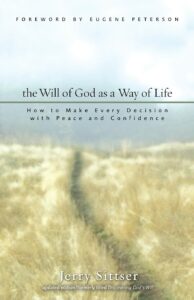 The Will of God as a Way of Life: How to Make Every Decision with Peace and Confidence Jerry Sittser with a foreword by Eugene Peterson (Zondervan) $15.99 OUR BOOKNOTES SALE PRICE = $12.79
The Will of God as a Way of Life: How to Make Every Decision with Peace and Confidence Jerry Sittser with a foreword by Eugene Peterson (Zondervan) $15.99 OUR BOOKNOTES SALE PRICE = $12.79
This is one of the very best books on this broader, less sensational way to live with purpose and peace, seeking God’s Kingdom as a way of life. Gerald Sittser has gone through much (including tragic loss, explored in A Grace Disguised) so he is an experienced and mature guide. In Peterson’s foreword he notes that Sittser’s writing is fresh and good but that he isn’t saying anything all that novel — which, for Eugene, is a big compliment. He notes, though, that we live in a time when the air is full of careless comment and commentary on the will of God.” Peterson continues, “Unfortunately too many of these comments have neither biblical footage nor theological integrity.” He applauds Sitter for his “unassuming modesty” and the “unpretentious conversational style that never descends to banality.” I call Sittser winsome; Peterson calls him companionable. Peterson says such time with such a companion is so valuable that we should read The Will of God as a Way of Life twice.
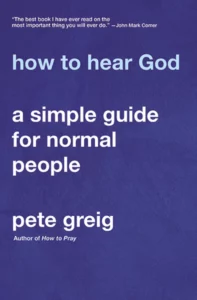 How to Hear God: A Simple Guide for Normal People Pete Greig (Zondervan) $18.99 OUR BOOKNOTES SALE PRICE = $15.19
How to Hear God: A Simple Guide for Normal People Pete Greig (Zondervan) $18.99 OUR BOOKNOTES SALE PRICE = $15.19
This is very new, a follow-up to his greatly appreciated How to Pray: A Simple Guide for Normal People and it looks very clear and very helpful. It is quite new and I haven’t read it yet,but wanted to announce it here.
Here is what John Mark Comer says about it:
Pete has simply written the best book I have ever read on the most important thing you will ever do: learning how to hear God. Pete calls this book ‘a simple guide for normal people.’ It is, but ‘simple’ is not the same thing as simplistic. This book is disarmingly wise, deep, insightful. With his extraordinary grasp of the church down through history and across the globe, Pete transcends the Christian tribalism of our day. He is rooting us in something far more ancient, unchanging, timeless. And hearing God’s voice is the key to everything.
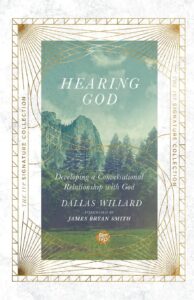 Hearing God: Developing a Conversational Relationship with God Dallas Willard (IVP) $22.00 OUR BOOKNOTES SALE PRICE = $17.60
Hearing God: Developing a Conversational Relationship with God Dallas Willard (IVP) $22.00 OUR BOOKNOTES SALE PRICE = $17.60
I hope BookNotes readers know of our affection for Dallas Willard and our respect for his many books of philosophy, spirituality, discipleship. This book first came out decades ago as In Search of Guidance and was ahead of its time. Once he became better known (and evangelicals, especially, learned to embrace more historic, contemplative spirituality through the words of Willard’s colleagues such as Richard Foster and Ruth Haley Barton) it was reissued with this succinct title. It is an exceptionally penetrating book, wise, challenging, highly recommended.
Now, it has been reissued again as part of IVP stellar “Signature Classics” series of some of their best books that have stood the test of time. It has an impressive new foreword by James Bryan Smith.
Richard Foster calls Hearing God, “The best book on divine guidance I have ever read.”
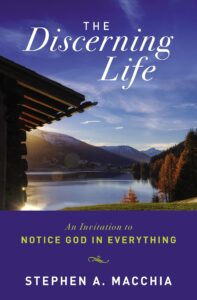 The Discerning Life: An Invitation to Notice God in Everything Stephen A. Macchia (Zondervan Reflective) $22.99 OUR BOOKNOTES SALE PRICE = $18.39
The Discerning Life: An Invitation to Notice God in Everything Stephen A. Macchia (Zondervan Reflective) $22.99 OUR BOOKNOTES SALE PRICE = $18.39
This is a very new book, released last month on the recent “Reflective” imprint of Zondervan books and two of my favorite evangelical mystics have nice endorsements on the back. Gary Thomas calls it a “new spiritual classics” and Ken Shigematsu, author of God In My Everything, says it is “wise, winsome, and worship-evoking,” and will “awaken you to the wonder of God’s presence.” Indeed. This book makes clear the idea that spiritual discernment is more than a “how-to guide” for making good decisions, but a posture and habit of attentiveness to God’s presence. It is not only for churches seeking to call a new pastor (when the lingo is often invoked) or some super spiritual way to discover God’s will for every little choice we make. This offers a biblically based vision for a lifestyle of “practicing a preference for God.”
There is, also, an appendix of 40 days worth of reflections by Reuben Jobs (with a few others) offering practices and exercises.
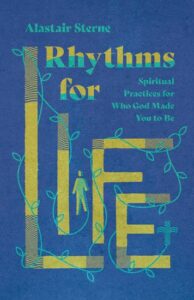 Rhythms for Life: Spiritual Practices for Who God Made You to Be Alastair Sterne (IVP) $16.00 OUR BOOKNOTES SALE PRICE = $12.80
Rhythms for Life: Spiritual Practices for Who God Made You to Be Alastair Sterne (IVP) $16.00 OUR BOOKNOTES SALE PRICE = $12.80
Oh my, friends, I’ve been wanting to mention this for a while — it is a perfect book to highlight here as it is a very nicely done reflection, inspiring and formational, offering an astute combination of two major trends in Christian writing — the contemplative stream of those wanting spiritual disciplines to help train them in the reflective life and questions about our identity and calling in Christ. In a way, this is a very practical book, but it is noticeably grounded in a sense of God’s work in the world and our call to follow Jesus in all areas of life. This is not about the spirituality of work, as such, but it invites us into habits and lifestyles which allow us to take up habits that give space for God as we discern how we serve God in the world.
It doesn’t do justice to this rich study, but to summarize it offers four aspects of our spirituality — I’d call them vibes that make up the rhythms — that point us upward to God, inward to self, with-ward in community, and outward in mission. It makes sense as Sterne is a church planting Anglican, his heart strangely warmed, I suppose, at Asbury, but now studying intercultural missions at Fuller. He lives in Vancouver, BC and is passionate about helping people flourish by living in community for the sake of missional engagement in the marketplaces of the world.
My friend Steve Garber knew him at Regent College in Vancouver, and writes this thoughtful recommendation to take up the book:
All theology should be applied theology, at least that was the argument of one of the best teachers I know, and the insight is ancient. As Jesus said to Nicodemus, the teacher of Israel, ‘The reason you don’t understand is that you don’t do the truth.’ That disconnect is a perennial problem, even when we yearn for more integrity. Alastair Sterne has written a book for all of us, but specially so for those who want to understand the integral relationship of what they believe with the way that they live. In Rhythms for Life he has woven together theology and experience with a rare wisdom born of his years of loving people who long for more flourishing in their lives for the sake of their cities.
 The Way of Discernment: Spiritual Practices for Decision Making Elizabeth Liebert (WJK) $20.00 OUR BOOKNOTES SALE PRICE = $16.00
The Way of Discernment: Spiritual Practices for Decision Making Elizabeth Liebert (WJK) $20.00 OUR BOOKNOTES SALE PRICE = $16.00
Dr. Elizabeth Liebert has been a professor of the spiritual life at San Francisco Theological Seminary, a PC(USA) seminary, so she is rooted in a broad and generous theological movement and writes seriously with nothing cheesy or sentimental. This book (along with the sequel, for church use, The Soul of Discernment: A Spiritual Practice for Communities and Institutions) has been very well received and is a staple in many spiritual direction programs.
As one reviewer put it, speaking of the profundity of The Way of Discernment:
Unlike ordinary decision making, it requires prayer and the accountability of a faith community to help us know which way to go. Drawing on Christian thinkers through the ages, from Ignatius of Loyola and Jonathan Edwards to Frederick Buechner and Thomas Merton, Liebert teaches that discernment is both a spiritual gift and an acquired habit that can be honed through regular practice. To that end, she provides extensive exercises to help readers identify and work through discernment issues in their own lives. Readers should plan to take time with this book, because the exercises yield their richest rewards through careful and slow implementation—ideally over a period of 11 weeks. While the author cautions that absolute certainty is rarely possible, a diligent practice of discernment can lead to confirmation. Liebert’s wise spiritual counsel will aid many seekers as they determine their next step.
BOOKS ON A THEOLOGY OF CALLING & VOCATION
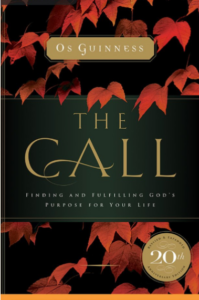 The Call: Finding and Fulfilling God’s Purpose for Your Life Os Guinness (Thomas Nelson) $17.99 OUR BOOKNOTES SALE PRICE = $14.39
The Call: Finding and Fulfilling God’s Purpose for Your Life Os Guinness (Thomas Nelson) $17.99 OUR BOOKNOTES SALE PRICE = $14.39
When I celebrated the updated anniversary edition of this a few years ago I wrote — after a whole bunch of setting the stage about the role of Dr. Guinness’s work on my own life and thinking, and how much I value this book, I wrote some of the following.
I want to remind you that The Call was one of the first contemporary, popular level books that developed the implications of this most important (but routinely misunderstood) theological doctrine, that of “calling” (and its related theme, “vocation.”) There is a huge renaissance of books on faith, calling, discernment, vocation, work, and serving God in varying spheres of society these days, and nearly all owe their moment to a series of talks Guinness did in the 1990s (including at First Presbyterian Church of York where we hosted him before the book came out) and the celebrated release of this seminal book in 1998. I do not think I am alone and I do not think I am wrong to suggest that the faith and work movement, the rise of marketplace ministry courses, the popular spread of conferences and workshops using the language of vocation and Christian views of work-a-day routines owe their existence in our time to how God was pleased to use this book as it was embraced by key leaders within the thoughtful end of the evangelical world.
The chapters are fairly short, though eloquent. They cover all sorts of ways in which a quest for a purposeful life is part of what we do as humans and how searching for some meaning, listening to a Voice, is essential. He tells amazing stories from literature, art, history, politics, and his own extraordinary life and offers a simple prayer at the end of each moving, informative chapter.
I love the core chapters where Guiness explains how the Protestant reformation blew apart the sacred/secular dualism of the medieval world. Monks and nuns were the only ones, in those dark ages, who were allowed to say they were “called.” Indeed, Martin Luther said “the men making the beer barrels and the women milking the cows are as important to the Kingdom God as the priests and the nuns.” They wanted to arrest him for such talk! William Tyndale, years earlier, was burned at the stake and one of the reasons was because he dared to say ordinary folks could use the language of vocation, that their work mattered to God. Guinness’s chapter about a Dutch monk that locked the doors of the church so folks wouldn’t obsess with liturgy, but take faith into daily life, called “Locked Out and Staying Out”, is worth the price of the book.
His central chapters “Everyone, Everywhere, Everything” and the follow-up “By Him, To Him, For Him” and the often-cited “The Audience of One” chapter are all simply unforgettable.
For anyone guiding others in vocational discernment, this solid teaching about calling (both our primary calling to follow Christ and our secondary callings to various offices and tasks) is crucial. “Be What You Are” is the sort of eloquent wisdom that will clarify much – and there is much to be clarified these days, with everybody from MBA programs and edgy entrepreneurs and church preachers insisting everyone must make a difference and find zeal in doing all kinds of spiffy stuff, finding your bliss and whatnot. This is sturdy, level-headed ballast, and exceedingly helpful as we think through things like jobs and happiness and occupations and retirement and such. That is, he reminds us not to overly identify our callings with our jobs. In a world as fallen as ours, in a culture arranged as ours, we may not find that our callings and careers are the same. If we’re lucky, it might be somewhat so.
For those in mid-life or beyond there is much assistance here, too; there is even a chapter on “Fighting the Noonday Demon” which is profound for those struggling with depression or what the ancients called sloth, or despair.
His bit about time is excellent, and, for those with curiosity about such things, his reflections will make you wise about the pressures of the modern world. It is, as I said, a remarkable book, learned and inspiring, insightful and enjoyable.
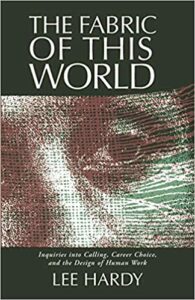 The Fabric of This World: Inquiries into Career Choice, and the Design of Human Work. Lee Hardy (Eerdmans) $26.99 OUR BOOKNOTES SALE PRICE = $21.59
The Fabric of This World: Inquiries into Career Choice, and the Design of Human Work. Lee Hardy (Eerdmans) $26.99 OUR BOOKNOTES SALE PRICE = $21.59
This is a philosophical, historical, theological, and practical exploration of work from an evangelical perspective, highlighting the Christian concept of vocation as articulated by Luther and Calvin, and making relevant applications for today. Written in the late 1980s, it was one of the early books helping kick off the avalanche of books on this topic over the last decades and has remained in print for these many years for good reason. It still is one of the best.
As one of the publicity description put it years ago, Dr. Hardy, who teaches in the philosophy department at Calvin University in Grand Rapids, MI, “looks creatively at the meaning of work according to Greek, medieval, Renaissance, Marxian, and Freudian perspectives, then at Luther’s view and subsequent Calvinist development and modification, concluding with contemporary Roman Catholic convergence. The second half of the book applies the theory to personal career choice and social job design; it then reviews seven management theories and ends with perceptive remarks about combining people-oriented choices and profit choices.”
Interestingly, at least to me, is that Dr. Hardy lived in Pittsburgh during PhD work when we did and came under some of the same (Kuyperian, among other) influences. Now he writes good books and we try to sell them. Thanks be to God! The Fabric of This World is highly recommended for those wanting some of the best “inquiries” into this topic.
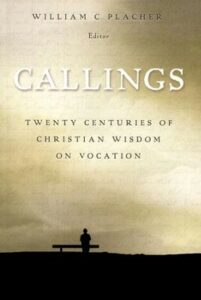 Callings: Twenty Centuries of Christian Wisdom on Vocation edited by William Placher (Eerdmans) $32.00 OUR BOOKNOTES SALE PRICE = $25.60
Callings: Twenty Centuries of Christian Wisdom on Vocation edited by William Placher (Eerdmans) $32.00 OUR BOOKNOTES SALE PRICE = $25.60
This is a big volume, a remarkable compendium of many of the great writings that have influenced the church through the ages. For better or worse, ancient leaders preached and taught and wrote about calling as they understood it, sometimes, for instance, exclusively for those called to monastic life or priesthood. (And from this we can learn how not to think about this stuff, but, yes, also, some good principles that might be applied more wholesale to others of us as well.) From the church fathers to Augustine, from the high middle ages to Luther, Calvin, Wesley, Baxter and others, to modern era writers as diverse as Bonhoeffer, Simon Weil, Howard Thurman, and Dorothy Sayers, this volume is extraordinary.
Here is how the publisher once described it:
What am I going to do with my life?” is a question that young people commonly face, while many not-so-young people continue to wonder about finding direction and purpose in their lives. Whether such purpose has to do with what job to take, whether to get married, or how to incorporate religious faith into the texture of their lives, Christians down the centuries have believed that God has plans for them.
This unprecedented anthology gathers select passages on work and vocation from the greatest writers in Christian history. William Placher has written insightful introductions to accompany the selections — an introduction to each of the four main historical sections and a brief introduction to each reading. While the vocational questions faced by Christians have changed through the centuries, this book demonstrates how the distilled wisdom of these saints, preachers, theologians, and teachers remains relevant to Christians today.
 Vocation: The Setting for Human Flourishing Michael Berg (1517 Publishing) $12.95 OUR BOOKNOTES SALE PRICE = $10.36
Vocation: The Setting for Human Flourishing Michael Berg (1517 Publishing) $12.95 OUR BOOKNOTES SALE PRICE = $10.36
I have written a bit about this before and a few knowing friends complimented the book with great enthusiasm. It explores the deepest questions behind and underneath the “vocation” question — namely, what does it mean to be human and what is the nature of the good life? As Luther often explained, once we are free from the burden of self-justification we can take on our various callings — masks, he called them, although perhaps these days we’d talk about wearing different “hats.” These are ways God equips us to love others, to care for the world God has placed us in. Ordinary life takes on a new hue. God frees us, then uses us to help craft a social order in society that reflects God’s great grace. Work and other cultural obligations become deeply spiritual avenues of worship and service. This is a great little book, clear and inspiring. Who knows, it might even make a Lutheran out of you!
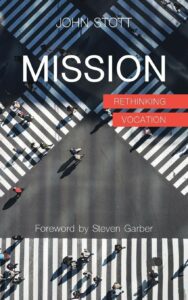 Mission: Rethinking Vocation John Stott; edited and with a foreword by Steven Garber (Regent College Press) $9.99 OUR BOOKNOTES SALE PRICE = $7.99
Mission: Rethinking Vocation John Stott; edited and with a foreword by Steven Garber (Regent College Press) $9.99 OUR BOOKNOTES SALE PRICE = $7.99
You know that I often cite the remarkable, profound, beautifully written volumes of Steve Garber. A few years ago when Steve was teaching a grad course in leadership and marketplace theology at the great Regent College in British Columbia he put together this small booklet excerpts from Stott’s historic Oxford lectures, published in the mid 1970s as Christian Mission in the Modern World. It includes the seminal portion where he so vividly reminds us that we all have a mission and, in the modern world, especially, this must include a sense of holy vocation in the work we do. To be salt and light with a whole gospel for the whole person in the whole world is an extraordinary calling, and Steve’s lovely introduction offers this small bit of Stott’s wisdom for us all.
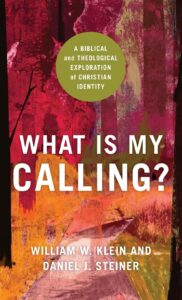 What Is My Calling? A Biblical and Theological Exploration of Christian Identity William W. Klein and Daniel Steiner (Baker Academic) $21.99 OUR BOOKNOTES SALE PRICE = $17.59
What Is My Calling? A Biblical and Theological Exploration of Christian Identity William W. Klein and Daniel Steiner (Baker Academic) $21.99 OUR BOOKNOTES SALE PRICE = $17.59
This is an amazing new book, important and helpful. It is firm in its critique of many books about calling, showing how we’ve not been clear about what the New Testament teaches regarding our calling unto Christ, using the word so widely that it can mean nearly anything. The pair are hard on everybody from Os Guinness to Frederick Buechner, and I get it. I wish they’d have lightened up a bit, but they are convinced that this appropriation of call language to one’s own passions or convictions or interests in jobs (call it “vocation, if you must” they begrudgingly say) bears less than helpful fruit. Anybody who teaches or writes or speaks about this simply must grapple with this book and heed at least most of its warnings. Those searching for guidance about one’s vocation might read other good books first, get the vision and the earnest help other’s provide, and then pick up this to have our lingo fine-tuned. It’s serious, uncompromising and an important contribution, especially for those of us offering leadership in this arena.
 Courage & Calling: Embracing Your God-Given Potential Gordon T. Smith (IVP) $20.00 OUR BOOKNOTES SALE PRICE = $16.00
Courage & Calling: Embracing Your God-Given Potential Gordon T. Smith (IVP) $20.00 OUR BOOKNOTES SALE PRICE = $16.00
I have reviewed this before, highlighted it at conferences, and we keep it on hand here at the shop as a staple on our shelves about vocation and calling. It’s nearly a classic, mature but not overly heady. I thought I would just share with you what the publisher says about it, cribbing from them so you hear how they pitch it:
God calls us first to himself, to know and follow him, and also to a specific life purpose, a particular reason for being. This second call or “vocation” has implications not only for our work or occupation, but also includes our giftedness, our weaknesses, our life in community and what we do day to day. In this book Gordon Smith invites you to discover your vocation by listening to God and becoming a coworker with him.
- What is my calling?
- How do I live it out in the midst of difficult relationships or moral challenges?
- Will my vocation change as I enter a new stage of life?
- With competing needs and demands, how can I craft a balanced way of living?
Smith addresses these questions and many more. This new edition has been revised and updated throughout with two expanded chapters and a new chapter on four specific areas of calling. Here is rich insight for all who long for the ears to hear and the courage to follow God’s call.
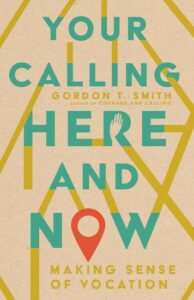 Your Calling Here and Now: Making Sense of Vocation Gordon T. Smith (IVP) $18.00 OUR BOOKNOTES SALE PRICE = $14.40
Your Calling Here and Now: Making Sense of Vocation Gordon T. Smith (IVP) $18.00 OUR BOOKNOTES SALE PRICE = $14.40
Wow. This is a brand new book and I wondered if Smith, who has written two books on this already, had anything more to say. His other two are great — he has a tremendous, important paperback volume (see above) called Courage and Calling and a short, practical one on praying about vocation (see below) called Consider Your Calling. Does anybody, really, need to write more about this? Well, he sure does have more to say and it is excellent.
Gordon T. Smith is President of Ambrose College and Seminary in Calgary, Alberta, and he has been praying and pondering and studying and talking with young students and older faculty for years, now. He has written about “thinking institutionally” (see his 2020 masterpiece, Institutional Intelligence: How to Build an Effective Organization) and about contemporary leadership (Wisdom from Babylon) and he has written a fairly big book about the Holy Spirit, a small one about giving spiritual direction, a major one about Christian formation into Christ-like character (see his hefty, helpful Called to Be Saints: An Invitation to Christian Maturity.) Over and over he has shown himself to be a life-long learner and a life-time teacher. Here he comes back to his theme of helping us (as one of the chapters puts it) being “stewards of our lives.” Nice, eh?
In this brand new one, Your Calling Here and Now, Smith comes back to a common refrain in nearly every section. He asks us to ask a simple question:”At this time and place, who am I meant to be, and what am I call to do.” Yes, it is exceptionally grounded theologically and biblically, but he offers reflections and practices to help us discern all this. Over and over he asks what we are called to be and do.
I like his groundedness — the “in this time and place, what…?” question. Such an approach, you will discover, includes a sense of place and the community God has put you in. He tells stories of the complexity of this (especially as a leader of an institution of higher learning) and how we are sometimes called to do certain things that simply must be done. If we do not do them, they will not be done. Is God speaking to us to do these things? Perhaps they are just in front of us, and we simply have to step up.
Our vocation, he notes, helpfully, is “the outworking of how God has made us.” That is, “it is not a goal on the horizon but a present reality that we are called to discern.” He is deeply spiritual in insight, but his writing is often upbeat. One reviewer called him “felicitous.”
This process need not be as elusive as it sometimes feels. This book can help. As Mark Buchanan — a wordsmith I love (his last one was about walking, called God Walk, but his classic is on the sabbath, called The Rest of God) — puts it, Your Calling Here and Now “is both primer and compendium.”
I absolutely loved Your Calling Here and Now. Full of brilliant insights and poignant vignettes, this book will give you the courage to show up for your life and inspire you to fulfill the purpose for which you were made. — Ken Shigematsu, pastor of Tenth Church, Vancouver, BC, and author of Survival Guide for the Soul
 What’s Your Call: What Are You Doing Here? Gary Barkalow (Cook) $14.99 OUR BOOKNOTES SALE PRICE = $11.99
What’s Your Call: What Are You Doing Here? Gary Barkalow (Cook) $14.99 OUR BOOKNOTES SALE PRICE = $11.99
I like this upbeat book, a broad examination of all sorts of senses of calling. It is pretty inspiring, energetic, inviting us to “discover God’s destiny and design” and live alerted to the “choreography of God.” It talks about story, about the assaults against our sense of calling, and ponders if call is a “job or a role.” The author works with men and women through The Noble Heart, and this carries an enthusiastic endorsement from Len Sweet, who says that, “Gary believes your calling makes you an artist. Read this book to discover the beauty of your art.” Fun!
I think it may be useful for beginners to serious Christian reading or for graduating high school kids, even. They’ll enjoy it.
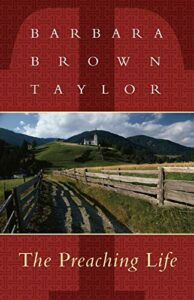 The Preaching Life Barbara Brown Taylor (Cowley) $17.95 OUR BOOKNOTES SALE PRICE = $14.36
The Preaching Life Barbara Brown Taylor (Cowley) $17.95 OUR BOOKNOTES SALE PRICE = $14.36
In a previous list that I did years ago at BookNotes — more than one person liked the clip of James Taylor singing “Millworker”, I wrote about this, and wanted to share about it again, here. The first half of this is a beautifully rendered memoir of Taylor’s conversion to faith, her sense of calling to ministry, and her eventual vocation as an Episcopal priest, preacher and writer. There are a few extended passages from which I sometimes read out-loud in workshops and talks — beautiful prose about God speaking to her through creation, the role of sacraments, the significance of the ordinary (themes she unpacks wondrously years later in her beloved An Altar in This World.) Her beautifully told reminder of how everyone’s workplace can be a place for sacramental experience of God’s goodness and grace is worth the price of the book! A few of these pages mean the world to me, and I had to list it.
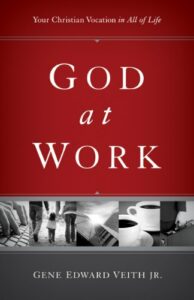 God at Work: Your Christian Vocation in all of Life Gene Vieth, Jr (Crossway) $14.99 OUR BOOKNOTES SALE PRICE = $11.99
God at Work: Your Christian Vocation in all of Life Gene Vieth, Jr (Crossway) $14.99 OUR BOOKNOTES SALE PRICE = $11.99
I like this a lot – Veith, who has written vividly about everything from postmodernism (he’s agin it) to country music (he’s for it) to the spirituality of the cross (he’s Lutheran, so he gets it) and and he brings a git of his conservative Lutheran flavor to this study of all the ways God uses humans to do the work God wants done in the world. You may know Vieth (he writes for World magazine) as a writer that teaches how Christ’s Lordship affects all of life. I like his insistence that we are not called to just one thing, but have various callings and offices — “masks” as Luther called them. Vieth even calls them “God’s hiding places.” Very clear, comprehensive.
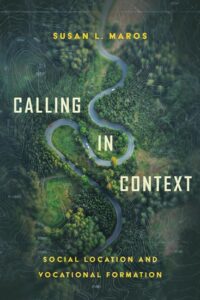 Calling in Context: Social Location and Vocational Formation Susan Maros (IVP) $24.00 OUR BOOKNOTES SALE PRICE = $19.20
Calling in Context: Social Location and Vocational Formation Susan Maros (IVP) $24.00 OUR BOOKNOTES SALE PRICE = $19.20
In some ways, this is the book I’ve been waiting for, that many of us who have been inspired and energized to help people discern vocations and think Christians about their careers and public lives have realized was necessary. It invites those thinking about spiritual formation and whole-life discipleship to consider notions of calling as shaped by the mental maps we assume to be true, to realize our “coming from” view colors and shapes how we see and think and live into our faith. The author is conscientious and explicate about her terms, about how (as a cisgender white conservative evangelical — perhaps with some Pentecostal experience, in seams) has had to learn from her BICOP students and international students and what some call “nontraditional” students, often from less privileged backgrounds, under resourced, as they say. Yes, Calling in Context clearly and helpfully guides us to see the many ways gender and class and ethnicity and nationality and so forth influences our worldviews (a word she doesn’t use) and thereby informs our attitudes about notions of God’s call on our lives.
I am not alone in celebrating this new contribution to our important, evolving theology of calling. Jane Lancaster Patterson, professor emerita of New Testament at Seminary of the Southwest in Austin, Texas, and director of the “Communities of Calling Initiative” at the Collegeville Institute, calls it “creatively critical.” She continues:
Calling in Context, fills a much-needed space in the literature on Christian vocation, engaging ways in which gender, racial and ethnic identity, economic status, and social class shape people’s vocational possibilities and practices of discernment. The book challenges individualist and idealist assumptions present in dominant North American understandings of vocation, inviting readers into richer conversation and vocational practice that is more attuned to the variety of ways in which vocation is experienced globally, more faithful to the range of biblical narratives of vocation, and more attentive to God’s interaction with human beings over time.”
There are several very important things going on here, including Dr. Maros’s narrative about her own work in caring for college students and preparing people to flourish by helping them learn how to join God’s work in the world. She has been significantly influenced by global mission leaders (hence, some of the amazing insights from cross-cultural anthropologists and missiologists) and by leadership development scholars, most notably, the excellent work of Robert Clinton, formerly of Fuller Theological Seminary’s School of Intercultural Studies. Anybody interested in what the critical scholars call “intersectionality” applied to Christian mentoring, leadership development, and spiritual direction, would do well to spend considerable time with Marks and her amazing summaries of data, her great footnotes, book suggestions, discussion questions, and the like. It is handsomely designed by IVP and is a book worth having.
I may say more later about this fascinating book, but even though I want to give this unique volume two large thumbs up, alas, there are just a few small things that might annoy some discerning readers. She has lots of sidebars that offer call stories — making the good point that for most of us, there is no one-time, burning bush moment, but that we grow into our sense of our purpose or call and how that may or may not line up with given vocations and jobs. This is good. And, most of those voices are themselves from women and men of color, some from poor or marginalized backgrounds. Again, this is very good. But too many are about the call to ministry; even those not called to conventional pastoral work are a bit removed from the ordinary work-places of most ordinary people. For instance, in a great story about a soundboard engineer, she affirms her technical craft, but she is working the board in her church. A professor is a professor “in the practice of ministry” as a seminary. A CPA didn’t mention at all how she balances the books, but how she is a marketplace “minister.” A Latina photographer had very moving story, but didn’t mention photography; not once. An impressive lawyer is doing vital political advocacy but his narrative was about his struggle not with his challenging job but with his journey as an Asian American. I’m bringing my own presuppositions and social location to bear in even saying this, of course, but, golly, I’d have appreciated a few butchers, bakers, and candlestick makers to fill out her otherwise very moving testimonials.
Rarely do experts on calling urge people to consider how God’s action in our lives is shaped by race, gender, class, and much more. In honest, profound, and biblically informed prose, Susan Maros opens up a whole new horizon on calling, revealing its complexity and brilliantly translating complicated concepts into everyday language so that all of us can grapple with vocation in more culturally sensitive and faithful ways. An invaluable addition to literature on calling! — Bonnie J. Miller-McLemore, E. Rhodes and Leona B. Carpenter Chair and Professor of Religion, Psychology, and Culture, emerita, Vanderbilt University, and coeditor of Calling All Years Good: Christian Vocation Throughout Life’s Seasons
Before the end of the introduction you will discover why Dr. Susan Maros is one of Fuller Seminary’s most respected and popular professors. By the end of the book, you will realize that almost all your assumptions about how God calls a person will be challenged. Filled with biblical reflections that will cause you to reconsider what you think you know, and stories and studies that will encourage you to rethink what you believe to be settled about the way vocation is formed, this book disturbs and deconstructs, and then provides wisdom and a way for reconstructing perhaps the most personal moments in a Christian’s life. I heartily recommend it. — Tod Bolsinger, Fuller Seminary and the De Pree Center for Leadership, author of Canoeing the Mountains
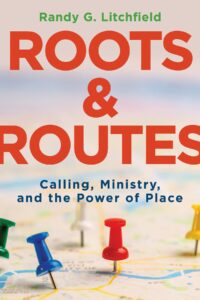 Roots & Routes: Calling, Ministry and the Power of Place Randy Litchfield (Abingdon) $29.99 OUR BOOKNOTES SALE PRICE = $23.99
Roots & Routes: Calling, Ministry and the Power of Place Randy Litchfield (Abingdon) $29.99 OUR BOOKNOTES SALE PRICE = $23.99
This is a book that seems to be motivated by some of the same concerns about social location — “place” as Litchfield puts — as the above title, Calling in Context.Yet, Litchfield’s story is different and he tells it as a mainline denominational seminary educator. He was an engineer and team manager at a GM plant and eventually studied Christian education at a seminary; he is the Browning Professor of Christian Education at Methodist Theological School in Delaware, Ohio. As one who has been in various denominations — Nazarene, Disciples, almost a Roman Catholic, United Methodist — he has quite a story. He has studied and been shaped by the influential pedagogies of the last 20th century, citing liberationist critical scholars and process theologians and faith development thinkers like James Fowler (who he says, rather oddly, I think, influential in conversations about vocation, which I frankly don’t observe.)
Not every book on discerning a sense of calling — and reflecting on all that that may mean, theologically, Biblically, and existential — is so attuned to these fluid and intersectional considerations and few engage place theologically as he does. (He draws considerably on Mary McClintock Fulkerson’s Oxford University Press text Places of Redemption: Theology for a Worldly Church.)
I like that he uses the phrase “vocational imagination” and, as the publisher puts it:
“Failed vocational imagination obstructs the effectiveness of individuals and the church as a whole in fulfilling their mission of partnership with God’s creating, redeeming, and sustaining work in the world.”
And, as Litchfield himself puts it, ”Place is the fabric of the drama itself.”
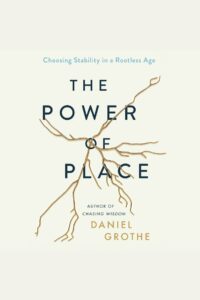 The Power of Place: Choosing Stability in a Rootless Age Daniel Grothe (Thomas Nelson) $25.99 OUR BOOKNOTES SALE PRICE = $20.79
The Power of Place: Choosing Stability in a Rootless Age Daniel Grothe (Thomas Nelson) $25.99 OUR BOOKNOTES SALE PRICE = $20.79
This is not directly a book about discerning God’s call on our lives or stepping into our various vocations, yet, as Litchfield shows in the rather dense read above, Roots & Routes, our sense of place is key to who we become, our own sense of purpose, and the stage on which our discernment of God’s guidance unfolds. (Heck, I say this in the introduction to Serious Dreams, I’m proud to say.) And so, I invite you to this recent work, one of the most delightfully interesting, challenging, helpful books on this topic in recent years. Like others these days, he uses the Benedictine notion of stability to help us resist the restlessness of mobility. (See, for a new discussion of this, Stability: How an Ancient Monastic Practice Can Restore Our Relationships, Churches, and Communities [Paraclete Press; $16.99] or the older Paraclete Press gem Wisdom of Stability: Rooting Faith in a Mobile Culture by the important author Jonathan Wilson-Hartgrove [$17.99.])
There are so many important writers on this topic, from Simone Weil to Wendell Berry to Kathleen Norris. Start with The Power of Place by Daniel Grothe. It will offer solid ground below your feet (tee-hee) as you lean into this earthy topic of vocation. And I’m sure you’ll have a blast reading it. Hoooray.
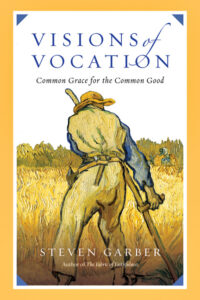 Visions of Vocation: Common Grace for the Common Good Steven Garber (IVP) $20.00 OUR BOOKNOTES SALE PRICE = $16.00
Visions of Vocation: Common Grace for the Common Good Steven Garber (IVP) $20.00 OUR BOOKNOTES SALE PRICE = $16.00
You may tire of me recommending this, although I’m sure you don’t grow tired of seeing that wonderful Van Gogh piece of the cover with its gloriously honoring illustration of the dignity of (dare I say?) the glory of, hard labor. The book deserves this artful cover as it is profound and melancholy, like the painter, even as it beams goodness. I cannot do justice to Steve’s big vision and serious scholarship and mature assessment of things and I ought not summarize it so simply, but one way to explain some of this book is to say it is about keeping on. About enduring setbacks, making peace with what is, even as we can be inspired by what can be, and what, someday in God’s timing, will be.
Visions of Vocation reminds us through real life stories, reflection on great novels and contemporary films, how some have found the grace to endure, knowing well how broken the world is and learning to love it anyway, as God so does. Can we appreciate what some Reformed thinkers called “common grace”? Can we give ourselves to engage in workplaces and families, governments and businesses, institutions of all sorts for the sake of love? From Dickens to Bono to Les Miserable, Steve points us to common goodness, graces, really, to give us the stamina and hope we need to continue to pursue our vocations and live into our calling. It isn’t a systematic teaching about the doctrine of vocation, but it is one of the most evocative and lasting books unpacking the implications of it all.
 Calling All Years Good: Christian Vocation throughout Life’s Seasons edited by Kathleen A. Catalan & Bonnie J. Miller-McLemore (Eerdmans) $20.00 OUR BOOKNOTES SALE PRICE = $16.00
Calling All Years Good: Christian Vocation throughout Life’s Seasons edited by Kathleen A. Catalan & Bonnie J. Miller-McLemore (Eerdmans) $20.00 OUR BOOKNOTES SALE PRICE = $16.00
What a unique and interesting book this is. The short version is that it asks and plumbs the question of what notions of vocation means in various ages and stages of life? What is the vocation of a child? A student? The seriously aged?
Dorothy C. Bass has been a leader of the conversations around topics of vocation (and co editor of the amazing book Leading Lives That Matter: What We Should Do and Who We Should Be) through her work at the Valparaiso Project on the Education and Formation of People in Faith. That she appreciates this volume should come as no surprise. Listen to this, an endorsement that also explains the book quite nicely:
Calling All Years Good brings a genuinely new and remarkably helpful set of perspectives to today’s lively conversation about vocation. By focusing on the distinctive character of vocation in different seasons of life, the authors help us to understand and appreciate the gifts and challenges of each. Their work will inform and inspire those who minister with a specific age group, such as children, youth, or the elderly. Further, it will encourage intergenerational communities of faith—especially congregations—to cultivate relationships across age-group lines, strengthening the capacity of all to respond to God’s call.”
Listen also to Douglas J. Schuurman, of St. Olaf College and author of Vocation: Discerning Our Callings in Life. He writes:
“Calling All Years Good develops an insightful and theologically rich understanding of vocation, a nuanced and textured interpretation of the stages of the life cycle, and a brilliant fusion of the two. Cahalan, Miller-McLemore, and other leading scholars combine the best social-science research on the stages of life with cutting-edge practical theology focusing on vocation to create a volume that is must reading for pastors, church leaders, and thoughtful Christians. There is no other book that treats this subject with such excellence, clarity, and insight.
 The Quotidian Mysteries: Laundry, Liturgy and Women’s Work Kathleen Norris (Paulist Press) $9.95 OUR BOOKNOTES SALE PRICE = $7.96
The Quotidian Mysteries: Laundry, Liturgy and Women’s Work Kathleen Norris (Paulist Press) $9.95 OUR BOOKNOTES SALE PRICE = $7.96
Not sure why I wanted to list this here, now, except that Kathleen Norris is a stunning memoirist and renowned, ecumenically-minded spiritual writer who here invites us to think about the ordinary stuff, the relationship between liturgy and life, and “the sanctifying possibilities” of everyday work. Given as the Madeleva Lectures at a Catholic women’s college, in the mid 1990s while famous for books like Dakota and The Cloister Walk, this little volume is esteemed by many who seek a spirituality of the commonplace and who are in the faith-in-the-work-world movement.
BOOKS ON DISCERNING ONE’S CALLING(S) AND VOCATION(S)
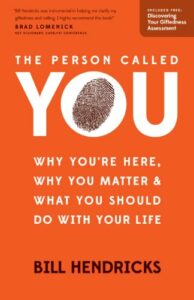 The Person Called You: Why You’re Here, Why You Matter & What You Should Do With Your Life Bill Hendricks (Moody Press) $15.99 OUR BOOKNOTES SALE PRICE = $12.79
The Person Called You: Why You’re Here, Why You Matter & What You Should Do With Your Life Bill Hendricks (Moody Press) $15.99 OUR BOOKNOTES SALE PRICE = $12.79
We have a number of very plain spoken, easy to understand, helpful guides to doing some self-assessment, helping readers become more reflective about who they are and what they are to be about. This book will help you or a young person you know realize who and what and why they are here. Hendricks has written about faith and work before so knows that world well, and he knows the Scriptures. I’m very big on this nice little book.
Listen to Cherie Harder who is President of the fantastic, thoughtful, significant organization The Trinity Forum:
The Person Called You is a deeply insightful, conversational, and welcoming guide to discovering one’s giftedness, identity, and vocation. Hendricks distills his practical wisdom from years of counseling and coaching to help readers not only identify and realize their own God-given giftedness, but in understanding its significance, impact, and obligations. A wonderful help for those struggling with their own sense of calling and purpose.
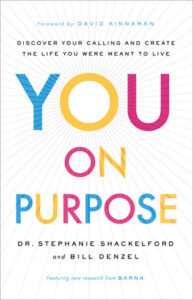 You On Purpose: Discovering Your Calling and Create the Life You Were Meant to Live Dr. Stephanie Shackelford & Bill Denzel (Baker Books) $19.99 OUR BOOKNOTES SALE PRICE = $15.99
You On Purpose: Discovering Your Calling and Create the Life You Were Meant to Live Dr. Stephanie Shackelford & Bill Denzel (Baker Books) $19.99 OUR BOOKNOTES SALE PRICE = $15.99
As you know, we have long desired to help people of faith live out their convictions in every area of life, particularly with a sense of calling as God’s agent of change in the world, including in their professional or vocational lives. That is, we want people to say, “Thank God It’s Monday!” instead of the dismissive TGIF. As some of these good books are quick point out, though, our offices or responsibilities or vocations (what some might call callings) include more than our jobs. Having helpful theological language about all this and a Christian world-and-life view broad enough to be a foundation for thinking Christian about the relationship of worship and work, Sunday and Monday, is so very important.
I say all this to suggest two things about You On Purpose. Firstly, this is by two authors who have had their feet in this stream and their ears to the ground about this conversation for a long time. Ms Shackelford and Mr Denzel are, it seems to me, very astute observers and interpreters of this big passion of ours —and yours, I trust —to empower ordinary Christians to integrate their faith and their work (or avocations, as they say) living for God’s glory in all things. This very well-designed book gets this big insight that we are here for a purpose and that our calling to follow Christ must be embodied in the real world. They know that people need to ask (that some cannot help but ask) what David Kinnaman in the foreword calls “Life’s Big Questions.”
However, secondly, and most importantly as I commend this fantastic read about living with purpose, Shackelford and Denzel have done the research, offering new data (from Barna) on this quest for meaning, for discovering calling. The subtitle explains the book’s value and even if it sounds a bit grandiose, it delivers.
You on Purpose is a simple, practical guide to helping you discover your God-given calling and gifts. This book enables you to redefine what you want your life to be about to help you live a purposeful life. — Rebekah Lyons, author of Rhythms of Renewal and You Are Free
Stephanie Shackelford and Bill Denzel have done a fantastic job outlining a clear, faithful decision-making framework that will help a generation get out of career paralysis and the angst that comes with not knowing what to do with your life. — Carey Nieuwhof, speaker, podcaster, author of Didn’t See It Coming: Overcoming the Seven Greatest Challenges That No One Expects and Everyone Experiences
Another vey nice feature of this helpful and inspiring guide are the tools and “field guide” questions. There are journaling exercises to help apply what they present from research they’ve done. Step by step they walked readers through the work. It’s jam-packed with great info, some of it presented in a creative and colorful infographic style.
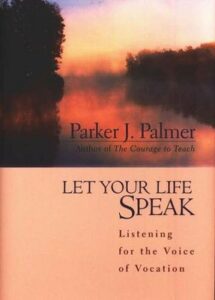 Let Your Life Speak: Listening for the Voice of Vocation Parker Palmer (Jossey-Bass) $18.95 OUR BOOKNOTES SALE PRICE = $15.16
Let Your Life Speak: Listening for the Voice of Vocation Parker Palmer (Jossey-Bass) $18.95 OUR BOOKNOTES SALE PRICE = $15.16
If the above book is conversational and instructive with good stories and lots of data and a plan of application, this book is meditative, reflective, and offers beautiful rumination on one central notion: listen to your heart. Let your life speak. I suppose you know the wise and gracious Quaker writer Parker Palmer who is known not only for being a bit of a spiritual master but a social and civic activist — people who read Thomas Merton or Henri Nouwen or Howard Thurman or Joan Chittister or Richard Rohr, say, like him. But many know that he worked as a young man in higher education (I have some rare documents rewrote up about the relevance of faith in higher education in the turbulent late 1960s!) One of his best selling books is the beautiful Courage to Teach that emerged from his philosophical reflection on the spiritual meaning of knowing and teaching (To Know as We Are Known.) Parker has said that he was seriously inspired by the sense of calling so many passionate teachers had (as he was writing his Courage to Teach books) that he was led to write about this notion of calling, or what he nicely calls “the voice of vocation.”
Written with an economy of style that is clean and calm, Palmer plainly tells about his own journey towards the Quaker adage that makes up the title, showing that this notion that vocation is “a gift, not a goal.” There is something very, very impressive about this which is why this tender book is a favorite of many. I wonder if it is useful for younger readers? Perhaps it isn’t for most happy-go-lucky 18-year olds, but it might be a book they will revisit a decade later. In any case it is a lovely, lovely, little book.
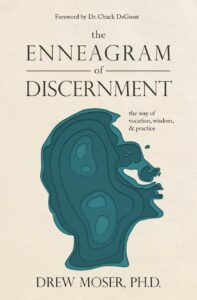 The Enneagram of Discernment: The Way of Vocation, Wisdom, & Practice Drew Moser (Falls City Press) $18.99 OUR BOOKNOTES SALE PRICE = $15.19
The Enneagram of Discernment: The Way of Vocation, Wisdom, & Practice Drew Moser (Falls City Press) $18.99 OUR BOOKNOTES SALE PRICE = $15.19
I have endorsed this book before, written with enthusiasm about how I wish it was more widely known. And I’m not even that interested in the enneagram, which, as the author admits, has become a bit faddish. Dr. Moser is a certified enneagram teacher and a beloved college professor at Taylor University, so is surrounded by young adults trying to figure out their lives, their majors, their careers, their callings. He knows these conversations well.
One of the big themes of The Enneagram of Discernment is that he believes the enneagram-talk in many circles is mostly about telling you who you are. (Or, they might say, giving you the tools to help you discover who you are.) Not unlike Myers-Briggs, say, it has been seen largely as a personality type test but in this fine book it becomes a map towards a discerning life. It is wise and helpful, not satisfied with reducing a person to a type but using the enneagram as a resource for a journey into a more discerning life.
For what it’s worth, enneagram rock stars like Suzzanne Stabile and AJ Sherrill Clare Loughrige have given rave reviews (calling it “essential” and “brilliant.”
Here’s one of our best pastoral care guys, a counselor from Western Theological Seminary, Dr. Chuck DeGroat:
Drew resists the faddish enneagram-talk that tells people who they are, instead inviting each of us on a journey of discernment, exploring every obstacle to becoming our true selves, uncovering our unlived lives, and discovering our hidden vocation. This immensely practical gift holds the possibility of transformation, for yourself and for a hungry and hurting world. Savor it!
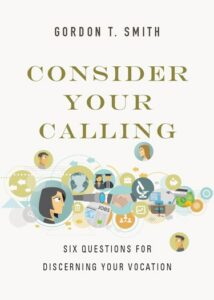 Consider Your Calling: Six Questions for Discerning Your Vocation Gordon Smith (IVP) $17.00 OUR BOOKNOTES SALE PRICE = $13.60
Consider Your Calling: Six Questions for Discerning Your Vocation Gordon Smith (IVP) $17.00 OUR BOOKNOTES SALE PRICE = $13.60
I will say this: you should read the books of Gordon Smith who is one of our great thinkers and writers about the spiritual life. I trust him and appreciate him — some compare his work to Dallas Willard or Eugene Peterson, a no-nonsense evangelical who cares about our interior lives and has written thoughtful stuff about the classic spiritual disciplines, about deeper Christian growth, about seeking God’s guidance, about the Holy Spirit. In recent years he has written about leadership, about institutional change, about higher education. I like him a lot. Perhaps you have noticed, above, his very important book Courage & Calling: Embracing Your God-Given Potential which I think is one of the top few in this whole genre.
Consider Your Calling: Six Questions is a short, compact-sized book that clarifies six things to pray about as you discern your own vocation. It is rich and thoughtful, mature and thoughtful, somewhere between Os Guinness and Parker Palmer, if you will. Rooted in a robust, evangelical vision of vocation, he here gives pastoral guidance for how to be reflective, self-aware, intentional, and prayerful in seeking God’s guidance. There is nothing so wise or clear on the market. Short and rather serious, really good for those who might want such an approach.
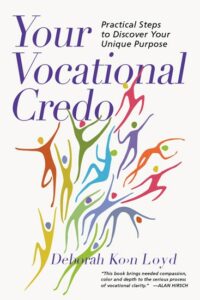 Your Vocational Credo: Practical Steps to Discover Your Unique Purpose Deborah Koehn Loyd (IVP) $16.00 OUR BOOKNOTES SALE PRICE = $12.80
Your Vocational Credo: Practical Steps to Discover Your Unique Purpose Deborah Koehn Loyd (IVP) $16.00 OUR BOOKNOTES SALE PRICE = $12.80
This. This is the one. This is the one I most often recommend to younger adults — college students, say —about how to enter into a season of discernment about one’s vocation. It has all the zippy stuff I want in a book about vocation and calling and making a difference by finding your sweet spot of purpose and so forth. It invites us to consider our story, to live into God’s story. I love it. However, it gets very, very practical (and, at times, pretty funny, even while at other times powerfully poignant.) I recommend this because of ho engaging Deborah Loyd is as she shows how to develop a “vocational credo.”
As with the other books in this list, it is not primarily about finding a job. A job emerges, hopefully, out of one’s deepest sense of calling that, in turn, has come from one’s sense of vocation and the “credo”one develops. In her hands this statement she helps us craft is more than a mission statement, not quite a full-throated manifesto, not as boring as a rule of life. I happen to think the cover art does not capture the joy and energy of this transformative work, although it tries. It is energetic and colorful, like the book.
The book is hopeful and yet honest. It includes a section about one’s griefs and sorrows because those laments and hardships also play a role as we form our vocational credos. There are a handful of great “self-help” books that are both visionary and compelling and very, very practical. This is a favorite and I highly recommend it if you or anyone you know wants to take up her invitation.
How do we make sense of our stories―that odd collection of puzzles and pain, risks and dreams, gifts and passions that make up our lives? In Your Vocational Credo, Dr. Loyd leads readers through a series of questions to craft their own vocational credos. Readers will not only be able to articulate their own why, but also who on earth they are here for. This book is a sure guide to anyone wanting to live with meaning.— Loren Kerns, associate dean, director, doctor of ministry program, George Fox Evangelical Seminary
In a world and church where many men and women of all ages and experiences settle for less and go through the motions of a job or ministry and doubt their passions and gifts, we are in desperate need of guides, mentors and encouragers who will help us get unstuck and find our way forward to live out who God made us to be. Dr. Deborah Koehn Loyd is exactly the right companion and catalyst for this journey. Packed with wisdom, real stories, biblical grounding and practical exercises, Your Vocational Credo is a much-needed tool for individuals, groups, churches and organizations. I know it will call many to life. — Kathy Escobar, co-pastor of The Refuge, spiritual director and author of Faith Shift: Finding Your Way Forward When Everything You Believe Is Coming Apart and Practicing: Changing Yourself to Change the World.
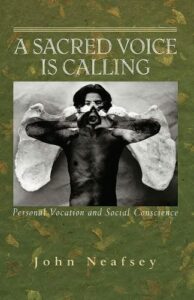 A Sacred Voice Is Calling: Personal Vocation and Social Conscience John Neafsey (Orbis Books) $24.00 OUR BOOKNOTES SALE PRICE = $19.20
A Sacred Voice Is Calling: Personal Vocation and Social Conscience John Neafsey (Orbis Books) $24.00 OUR BOOKNOTES SALE PRICE = $19.20
I wonder how many here know the famous and lovely line by Frederick Buechner who, in )))) describes vocation as “where our deep gladness and the world’s deep hunger meet.”? And I wonder how many of us actually get to live that. (And, further, how, finally, this may not be an adequate view calling, anyway.) Still, I mention this well-known aphorism, because it does hold up the notion that what we chose to do with our lives, what work we do in the world, ought to somehow meet some real need, contribute in some way to bettering the world, loving our neighbors as it were.
Neafsey ratchets this up a bit and I am grateful. Both eloquent and spiritually enriching, this exploration of what it means to find and follow our personal calling given this obligation to “social conscience” as he puts tin the title. I wish more of the books on vocation and the faith-work conversations included a bit more of this prophetic edge. How do we distinguish between the “still, small voice” of our authentic vocation and all of the other competing counterfeit voices in our hearts and the needs of our world?
I admire Sharon Daloz Parks whose work on higher education and “the critical years” I studied in graduate school; she later wrote an impressive, scholarly book on mentoring young adults in their search for meaning called Big Questions, Worthy Dreams. That she endorses this Sacred Voice Is Calling should matter to some of our BookNotes readers. Perhaps you, too, need this book about “personal vocation and social conscience.”
+++
TO PLACE AN ORDER
PLEASE READ THESE REMINDERS AND THEN CLICK ON THE “ORDER” LINK BELOW.
It is helpful if you would tell us how you prefer us to ship your orders. The weight and destination of your package varies but you can use this as a general guide.
There are generally two kinds of US Mail options, and, of course, UPS. If necessary, we can do overnight and other expedited methods, too. Just ask.
- United States Postal Service has the option called “Media Mail” which is cheapest but can be slow. For one typical book, usually, it’s about $3.50.
- United States Postal Service has another option called “Priority Mail” which is $8.35 if it fits in a flat rate envelope. Many children’s books and some Bibles are oversized so that might take the next size up which is $8.95. “Priority Mail” gets much more attention than does “Media Mail” and is often just a few days to anywhere in the US.
- UPS Ground is reliable but varies by weight and distance and may take longer than USPS. We’re happy to figure out your options for you once we know what you want.
– DON’T FORGET TO LET US KNOW WHAT SHIPPING METHOD YOU PREFER –
BookNotes
SPECIAL
DISCOUNT
20% OFF
ALL BOOKS MENTIONED
+++
order here
this takes you to the secure Hearts & Minds order form page
just tell us what you want to order
inquire here
if you have questions or need more information
just ask us what you want to know
Hearts & Minds 234 East Main Street Dallastown PA 17313
read@heartsandmindsbooks.com
717-246-3333
It is complicated for us, but we are still closed for in-store browsing due to our commitment to public health (not to mention the safety of our staff and customers.) The vaccination rate here in York County is sadly lower than average and the transmission rates are on the rise.We have concerns about this new variant appearing in May 2022. Our store is a bit cramped without top-notch ventilation so we are trying to be wise and faithful.
Please, wherever you are, do your best to be sensitive to those who are most at risk. Many of our friends, neighbors, co-workers, congregants, and family members may need to be protected since more than half of Americans (it seems) have medical reasons to worry about longer hazards from even seemingly mild Covid infections.
We are doing our famous curb-side/back yard customer service and can show any number of items to you if you call us from our back parking lot. We have tables outback that work well if the weather cooperates. We are eager to serve and grateful for your patience as we all work to mitigate the pandemic.
Of course, we’re happy to ship books anywhere. Just tell us how you want them sent.
We are here 10:00 – 6:00 EST / Monday – Saturday, closed on Sunday.

